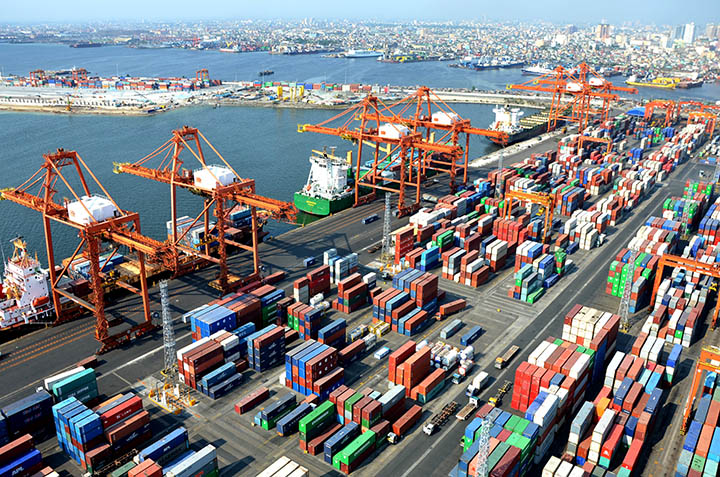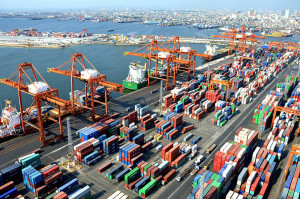

Global port operator International Container Terminal Services, In. (ICTSI) posted a 1.3% decline in net income in the first half of 2015, even as cargo volumes handled grew 9% for the same period in review.
In a disclosure to the Philippine bourse, ICTSI reported a net income attributable to equity holders of US$100.4 million, down from $101.7 million year-on-year.
Excluding one-time gains and charges from the sale of a non-operating subsidiary, termination of contract, and settlement of insurance claims in the same period last year, the recurring net income grew 20% in the first half of 2015, noted ICTSI.
In the second quarter alone, net income declined 6% to $46.4 million from $49.3 million from the same period last year.
Revenue from port operations, on the other hand, increased 8% to $552.1 million in the first half of 2015 from $510.3 million in the same period last year.
ICTSI said the favorable performance was mainly driven by volume growth at most of the company’s terminals; the favorable volume mix and higher ancillary services at Subic Bay International Terminal Corp. (SBITC) in Subic Bay, Philippines; new shipping line contracts and services at Pakistan International Container Terminal (PICT) in Karachi, Pakistan; consolidation of terminal operations in Yantai, China; continuing ramp-up at OPC in Puerto Cortes, Honduras and Contecon Manzanillo S.A. (CMSA) in Manzanillo, Mexico; and the revenue contribution of the new terminal in Basra, Iraq.
This, however, was partially offset by lower storage and break-bulk revenues combined with the 29% depreciation of the Brazilian real against the US dollar at Tecon Suape S.A (TSSA) in Recife, Brazil; discontinued vessel calls by two major shipping lines as a result of continuing labor disruption at ICTSI Oregon, Inc. in Portland, Oregon, USA; weaker short-sea trade and reduced vessel calls at Baltic Container Terminal in Gdynia, Poland; and slow economic activity coupled with the 23% depreciation of the Euro against the US dollar at Madagascar International Container Terminal Services, Ltd in Toamasina, Madagascar.
Excluding the revenue from the new terminal, organic revenue growth was 6%, the listed operator said.
The group’s eight key terminal operations in Manila, Brazil, Poland, Madagascar, China, Ecuador, Pakistan, and Honduras—which accounted for 82% of the group’s consolidated revenues in the first six months of 2015—grew 9% compared to the same period last year.
However, second-quarter results showed revenue declined 2% to $256 million from $261.4 million in the second quarter of 2014. The port operator said excluding the non-recurring gains recognized and one-time tax expenses at its terminals in Karachi, Pakistan and Aguadulce, Colombia, recurring net income would have increased 5%.
Cargo traffic growth
ICTSI reported handling a consolidated volume of 3.888 million twenty foot-equivalent units (TEUs) in the first six months of 2015, or 9% more than the 3.566 million TEUs handled in the same period in 2014.
The company said the increase in volume was mainly due to the continuing volume ramp-up at CMSA and Operadora Portuaria Centroamericana, S.A. de C.V. in Puerto Cortez, Honduras; new shipping line contracts and services at PICT; increased demand for services at SBITC; favorable impact of consolidation at Yantai International Container Terminals; and the contribution of its new terminal, ICTSI Iraq, in Basra, Iraq which began commercial operation in November 2014. Excluding the volume generated by the new terminal in Iraq, organic volume growth was 7%, ICTSI noted.
The company’s eight key terminal operations in Manila, Brazil, Poland, Madagascar, China, Ecuador, Pakistan and Honduras, which accounted for 77% of the group’s consolidated volume in the first half of 2015, grew 6% compared to the same period last year.
In the second quarter of 2015, total consolidated throughput was 5% higher at 1.905 million TEUs compared to 1.809 million TEUs in 2014.
Capital expenditures for the first six months of 2015 amounted to $136.7 million, or about 26% of the $530 million capital expenditure budgeted for the full year 2015.
“The established budget is mainly allocated for the completion of development at the company’s new container terminals in Mexico, Honduras and Iraq; capacity expansion in its terminal operation in Manila; and to start the development of the new terminals in Democratic Republic of Congo and Australia,” the port operator said.
In addition, ICTSI said it invested $52.9 million in developing Sociedad Puerto Industrial Aguadulce S.A., its joint-venture container terminal development with PSA International Pte Ltd (PSA) in Buenaventura, Colombia. The company’s share in the completion of the first phase of the project in 2015 is about $140 million.
Meanwhile, gross moves per hour per crane at ICTSI’s eight key terminals ranged from 18.6 to 29 moves in 2015 from 16.5 to 30.9 moves per hour per crane in 2014. Crane availability ranged from 90% to 99.1% in 2014 to 88.5% to 98.9% in 2015. Berth utilization was 21.2% to 72% in 2015 from 23.8% to 100% in 2014.
ICTSI is involved in 30 terminal concessions and port development projects in 20 countries worldwide, of which four are ongoing port development projects in Argentina, Colombia, Congo, and Australia; and a sub-concession agreement to develop, manage and operate a port in Nigeria; and a recent acquisition of an existing concession to construct and operate a port in Tuxpan, Mexico.




